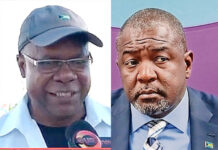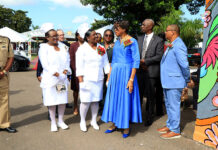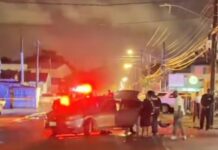Good evening, everyone.
In this my first public national statement for the year, I would have preferred to have taken this time to set out the plans we have in place to further lift our national development in 2024.
Instead, with the country having witnessed 11 murders over the past 14 days, I want to speak to you about the things we are doing to reduce the incidence of crime, and the plans we are beginning to implement ultimately to prevent crime being committed in the first place.
Over the past year, and in the past few weeks in particular, New Providence has been the scene of senseless carnage, much of it attributed to persons already on bail for serious offences.
Most murderers and victims have also been connected to those associated in some way with gangs.
Gang-related activity has plagued our country for far too long.
Over the years a number of initiatives have been launched to try to deal with it.
We are now preparing the most comprehensive approach yet.
Our frontline response to the present crisis is to bring forward a strategy which is already in the advanced stages of planning.
Our approach lies in three stages: ‘Clear, Hold and Build’.
We’re going on the offensive.
Put simply, our first phase is to ‘Clear’ out the gangs from our neighbourhoods.
Our police, armed with new resources and resolve, will strike hard against these gangs.
We’re not just disrupting them, we’re dismantling them.
We will show no mercy to those who have shown no mercy to their fellow citizens.
If you choose crime, you will face the full weight and might of the law.
After we clear these neighbourhoods, we’re not just walking away.
We will move to phase two, which is the ‘Hold’ phase.
Our police will ‘hold’ these communities by maintaining an ongoing, relentless presence.
This is an area which we think has not been addressed fully in the past.
We’re sending a clear message to any criminal who thinks they can make a comeback: we’re here, we’re here to stay, and we’re not going anywhere.
This phase is about constant vigilance and strength.
Lastly, we ‘Build’ – not just buildings and roads, but building opportunities, building futures, building hope.
This is about investing in our communities, creating opportunities that didn’t exist before, and ensuring that crime is never again seen as a desirable option.
We’re not just reclaiming our streets; we’re revitalizing them.
‘Clear – Hold – Build’!
It’s an approach which has been used in some form or another in other countries, with significant degrees of success.
We are adapting it to suit the situation on the ground here in The Bahamas, and we are fully resolved to do what is necessary to succeed.
Most of the killings are gun-related.
There are far too many firearms on our streets.
In fact, we have already begun to take more aggressive actions against those found in possession to support our zero-tolerance approach.
Our Anti-Gang and Firearm Task Force is in full swing.
Last year the Judiciary designated a magistrate specifically to deal with firearms offences.
We now have quicker prosecutions, with stiffer penalties being imposed.
From the date of first appearance in court to conviction or acquittal, it now takes an average of two months rather than a number of years as was previously the case.
The backlog is also being cleared.
Swift Justice is at work.
We will build on this success.
Friends:
You won’t believe where we’re finding these guns: stashed in cereal boxes and tucked away in snack packets, buried in innocent-looking surroundings.
Guns are also being hidden by girlfriends, parents and grandparents.
Most worryingly, children and young people are being used to hide weapons near schools or even attempting to smuggle them in their underwear – and this is true of both girls and boys.
It’s clear evidence of the lengths criminals will go to.
But let me tell you, no matter how clever these gangs think they are, our task force is smarter, tougher, and more determined.
We’re uncovering their tricks, and we’re putting an end to their game.
There’s another hard truth at play: we don’t make guns here in The Bahamas.
These firearms are coming from abroad, primarily from the United States.
I’ve been straight with the US Government about the need to step up their game, and they have, as a result, tightened their response.
Our partnership with The Bureau of Alcohol, Tobacco and Firearms is strengthening.
We’re not just talking; we’re taking action.
We’re tracking down Bahamians with dual citizenship who have been buying guns in the US and trafficking them here.
And it’s working – we’ve already busted some major operations.
During the past two years, we have significantly increased the resources to help the police to be more effective.
We have recruited over 200 more officers, brought more vehicles onto the streets, provided more technological support, more firearms and so on.
We now need to go even further.
Trained police officers are already in every school.
We will enhance their capacity to ensure safety at school, and build positive relationships with students.
We will increase police presence in high-crime areas to deter criminal activities.
We will install more state-of-the-art surveillance technology using Facial Recognition CCTV, to help with crime detection and prevention.
We are encouraging officers to build stronger community ties in order to improve intelligence-gathering,
We are creating dedicated teams to provide assistance and protection to witnesses in criminal cases.
We are reviewing the operation of the Confidential Informant Fund with a view to increasing resources to enhance the effectiveness of information-gathering and covert operations.
We are constructing a National Forensic Laboratory in order to reduce our dependency on foreign jurisdictions.
We will then be able to conduct our own forensic analyses, which will significantly speed up investigations and improve the quality of evidence used in trials.
We are going to introduce the toughest Anti-Gang Legislation ever.
If you are associated with a gang, we are coming after you.
If you have a lot of shiny things no way to explain your wealth, we are going to seize what you have.
But let’s be clear: this is not just about more police on the streets; it’s about smarter, strategic policing.
We are targeting the hotspots, dismantling the networks, and choking off the lifelines of these criminal organizations.
Our message to the gangs is unequivocal: you will find no safe haven in The Bahamas.
We will find you, we will stop you, and we will bring you to justice.
My Fellow Bahamians:
One of the hallmark values of my administration is ‘compassion’.
I am proud of this.
We aim to provide competent, compassionate leadership for all Bahamians.
This reflects one of my core personal values, as to how I think decent human beings ought to treat each other.
But anyone who mistakes ‘compassion’ for weakness, is in for a very, very rude awakening.
We are all likely to be affected by the more intrusive policing which is coming.
We will not violate anyone’s civil liberties, but you are likely to be impacted by more roadblocks and unannounced police action.
This may make you late for your appointments or delay plans you have, but this is a small price to pay for the collective benefit of having our streets made safer and our lives less blighted by murder and other violent crimes.
We ask for your co-operation, support and trust as the police go about their business.
Rather than complain about any inconvenience, maybe thank those officers who are working on our behalf.
In turn, officers will be reminded that they are to operate at all times within the law, and treat each person with the necessary courtesies and dignity.
We’re all in this together, and together, we will win.
But our fight against crime isn’t just about gangs and guns.
Social and Domestic violence is a cancer in our society, eating away at the fabric of our communities.
We seem to have lost the ability to deal with our conflicts in ways which don’t automatically lead to violence.
That’s why we’ve set up a dedicated Domestic Violence Unit within the Royal Bahamas Police Force.
This isn’t just another police department.
We’ve got officers specifically trained to handle these sensitive cases, to protect the victims and deal with the perpetrators the way they deserve to be dealt with.
But we need to go further.
And so, I am asking Ministers to recommend a package of measures which may be adopted to help improve the ways in which we resolve our conflicts across the whole of society.
Cussing, Fists, Knives and Guns have no place in how we resolve our differences.
While the police move forward to ‘Clear, Hold and Build’ our communities, there is still much, much more that needs to be done to reduce crime in our country.
In the past, while a lot of attention has been given to the policing effort, other factors which contribute substantially to crime, have not had the same focus.
Back in August last year, we agreed a strategy which would tackle the entire criminal lifecycle.
We recognised that we need both a ‘Whole of Government’ and a Whole of Society approach if we are both to reduce crime, as well as root out the causes of crime.
In October, we convened a ‘Gang Crime and Justice Task Force’ to drive the implementation of that strategy.
While it is driven by me and the team in my office, it is chaired by the Minister of Education, and the Minister of National Security.
The Task Force meets weekly and is attended by a number of Ministers, the Commissioner of Police, the Commissioner of the Bahamas Department of Correctional Services, and the Commodore of the Defence Force and their teams.
Other non-governmental participants attend the Task Force as needed.
The strategy emerged from an understanding that crime is not just a legal issue but a societal one,
Crime is not just a legal issue.
And the causes of crime are deeply rooted in a range of social, economic, and psychological factors.
The strategy draws on contemporary research, successful models from around the world, and consultations with experts across various fields.
We break it down into Five Pillars for Action:
Firstly, Prevention.
This is the ultimate aim of all our efforts: to prevent crime from being committed in the first place.
This pillar focuses on addressing the root causes of crime.
It involves community development, educational initiatives, social services, and economic opportunities, aiming to prevent the emergence of criminal behaviour, particularly among at-risk populations.
Secondly, Detection. We need to strengthen our efforts in Detection and make sure they are sufficiently linked with all the other areas that are contributing to the growth in crime.
It involves modernizing policing methods, enhancing training, and incorporating technology for efficient crime prevention and detection.
Our Action Plan to ‘Clear, Hold and Build’ will drive this Pillar.
Thirdly, there is the pillar which covers everything relating to Prosecutions.
Once charges are brought against an individual, the criminal justice system needs to provide a swift and fair process.
Actions taken under this pillar include reforms in the judicial system to expedite legal proceedings, the establishment of special courts to handle specific types of crimes, and the provision of support systems for victims and witnesses.
The Fourth Pillar is that of Punishment.
We need to ensure that while fair and proportionate punishments are imposed, they also need to act as deterrents to those thinking about engaging in criminal acts.
In consultation with the Chief Justice and other stakeholders, we therefore propose to introduce sentencing guidelines, and integrate restorative justice practices as part of the appropriate punishment.
Finally, we will prioritise Rehabilitation.
This final pillar aims to prepare offenders for successful reintegration into society.
There is no point releasing people back into the community if we have not tackled the behaviours that caused them to offend in the first place.
It includes vocational training, educational programs, mental health and substance abuse treatment, and support networks to reduce the chances of people falling back into offending.
The reason why each of these five pillars is so important, is that they are all inter-connected.
Each one has a major effect on the others.
We have put together a number of initiatives under each pillar, some of which are already underway.
Tomorrow my office will release a list of some of these programmes so that you can see the range of interventions that are taking place.
Bail
I want to make special mention here of the issues surrounding the granting of bail.
The issue of bail has been widely debated.
This is understandable given the fact that so many of the murders being committed are done so by those who are out on bail, and that those on bail themselves in turn become victims of murder.
I understand the frustration and the blame-shifting that have surfaced during these debates, but there are some realities which must be faced.
A judge has the right to use his discretion when granting bail.
Judges in The Bahamas live in The Bahamas, and they know the truth of the statistics: releasing these men on the streets is akin to a countdown to a death sentence.
We all have a responsibility to address this issue: the Judiciary, lawyers, and central government.
In this context, I think it important to address a troubling situation where we find repeat serious offenders being granted bail and either becoming victims of murder or perpetrating serious offenses while on bail.
These, in my opinion, justify a more aggressive approach by the judiciary in denying bail in murder cases.
In my view, the prosecutors must likewise be more aggressive in appealing instances where bail is granted and the elements I have just described exist.
Tomorrow will be our National Day of Prayer.
I hope that each of you will participate, in whatever way you can, so that we can provide each other with our mutual support, as we engage in national soul-searching.
I am grateful to the Christian Council for convening this Day to bring our nation together and pray for healing.
We all need to play our part.
Whatever success we may have from our ‘Whole of Government’ approach, will only go so far.
We need everyone – the Whole Society – to join in the effort.
If you are a parent or friend or neighbour or family member who sees guns under the bed or in the closet and fail to do something you are part of the problem.
You might believe that you are protecting your child – but you are likely doing the opposite.
The longer they are part of gang life, the shorter their lives are likely to be.
If you are keeping company with the wrong crowd, you may easily become not just part of the problem, but part of the murder count.
Do the right thing.
If you see something, say something.
I have instructed the Attorney General and the Minister of Social Services to review the laws with the view of bringing additional measures against parents and other family members who fail to live up to the sacred responsibility of protecting children.
We will have a society and country where failure in parenthood, resulting in endangerment and negligence, will be met with accountability.
For those who, despite everything, insist on engaging in criminality, understand that it boils down to two options.
Either you accept our hands in partnership to a different way of life, or, you will face the blunt instrument of the law.
The choice is yours.
Tonight, because of the seriousness of what we are dealing with, it is easy to forget that there is still much to be proud of and feel grateful for in our country.
Even given the horrors of what we have seen on our streets, we must not abandon hope.
We must remain sensitive to our common humanity and do what we know to be the right thing.
And it can start in small but impactful ways.
Let us make every effort to respect each other, especially those we do not know.
Let us stop sharing images of murder victims.
Let us all aim to exercise more patience and restraint in our responses to those with whom we are in conflict.
All is not lost.
We can save this country.
And I believe, with God’s help, we will save this country.
Good night, and may God bless you all, and bless our Commonwealth.
END







